It's a bit early to panic, but a home draw vs. Canada and a lack of judgment from one of the U.S.'s leaders in the build-up to it make things more uneasy on the road to Qatar.
NASHVILLE, Tenn. — The luster and resonance of the two trophies lifted this summer is fading.
U.S. men’s national team coach Gregg Berhalter had warned that World Cup qualifying failure would erase the significance of the recent Concacaf Nations League and Gold Cup titles claimed by his young but promising team. Those were stepping stones. The World Cup is the competition of record. It’s how you’re judged and remembered.
“Winning the Nations League was nice. Winning the Gold Cup was nice,” Berhalter told his team last week before qualifying kicked off. “But this is essential. If we want to make [an] impact, guys, it’s qualifying and doing well at the World Cup.”
Qualifying hasn’t started well. Considering the circumstances, conditions and relative inexperience of Berhalter’s team, Thursday’s scoreless draw in El Salvador was understandable and acceptable. But Sunday night’s 1–1 tie against Canada at Nissan Stadium is a blow. It halts a ton of momentum, raises considerable questions about the team’s preparation and approach and puts the U.S. in an early Octagonal hole heading into Wednesday’s window-closing game in Honduras.
The U.S. (0-0-2) is now level with Honduras (0-0-2) in fourth and fifth place in Concacaf’s eight-team qualifying competition, which will send the top three finishers to Qatar and the fourth to an intercontinental playoff. Home-field misfortune played a massive role in the Americans’ failure to make the 2018 World Cup. Now Berhalter and his reborn national team are starting down a frustratingly similar path, dropping two points on home soil and facing something close to a must-win situation on Wednesday in the inhospitable cauldron of San Pedro Sula.
"Of course we expect more. We want to win. We wanted to win both of the these games, absolutely. But this is the position we’re in now," said Christian Pulisic, one of the few holdovers from 2016-17.
“I remember last qualifying losing both our first two games. So yeah, this is what it is now. We have plenty of games left to play in this qualifying, It’s almost like a season. So we still have a long way to go, so our heads are going to stay up. … We have to really turn it around and we need to start winning games.”
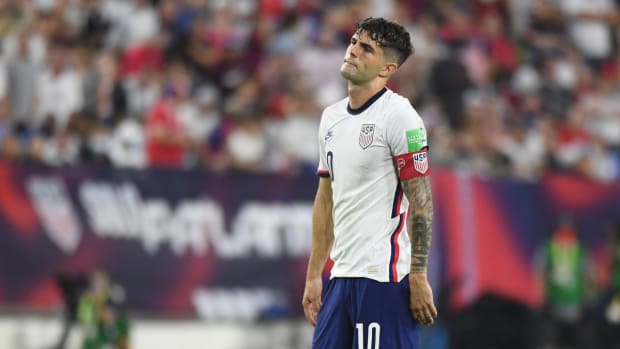
Christopher Hanewinckel/USA TODAY Sports
It is indeed almost like a season, and the narrative is just as rich. There are so many levels to qualifying, from the stakes, increased attention and rivalries to the travel, atmosphere and uniquely competitive environment. All of that tests a team’s culture, concentration and confidence. There’s a lot to manage and master, and it demands maturity, focus and an ability to rise to the occasion again and again. Despite the individual talent, the impressive club resumes and the two titles won this summer, this U.S. team just isn’t there yet.
“It’s a good lesson when you talk about World Cup qualifying and what these games are and the level of intensity in these games,” Berhalter said following the tie. “What you need is guys that are fit, guys that are strong, guys that are in form. That’s the most important thing.
“It’s a grueling, grueling week of three games with a lot of travel. A lot of guys have come from Europe, and that’s just part of it and we’re adapting to that,” he continued. “Obviously we would’ve loved to get the win tonight. But we’ve got to move on, and for us it’s about getting 11 fit guys on the field who will want to compete and get a result in Honduras."
The Octagonal is just beginning, but finding 11 fit guys who want to compete has already become a challenge. World Cup qualifying requires good fortune, timely execution and resolute discipline. The Americans could use a bit more of each, and their struggles on each front lend a foreboding tinge to their two-point start.
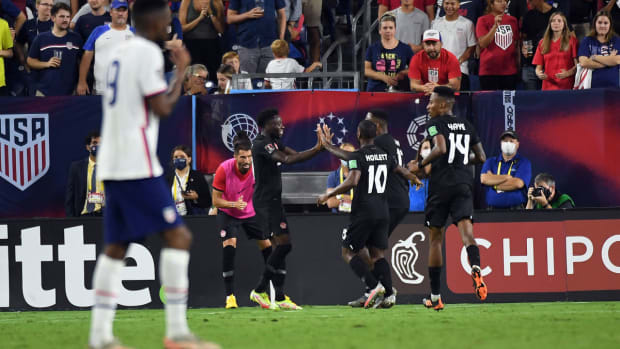
Christopher Hanewinckel/USA TODAY Sports
Berhalter made six changes from the XI that started in El Salvador. The most welcome was the return of Pulisic, who missed that trip while returning to fitness following a COVID-19 diagnosis and subsequent quarantine. He took up his customary place on left wing, captained the side and lasted all 90 minutes. But Berhalter’s plans were disrupted by a hamstring strain suffered by Gio Reyna that would rule him out of action in both Nashville and Honduras and, worse, Weston McKennie’s stunning suspension for breaking an unspecified team rule.
McKennie, 23, is one of the U.S.'s most influential players, and he’s a member of the national team’s six-man Leadership Council. While Berhalter declined to offer details, McKennie wrote via Instagram, “Unfortunately I am suspended for tonight’s match due to a violation of team COVID protocols. I am sorry for my actions. I will be cheering hard for the boys tonight and hope to be back with the team soon.”
The midfielder remained at the team hotel during the match, and Berhalter said McKennie’s availability in Honduras “remains to be seen.” McKennie is a dynamic and charismatic athlete who’s become one fo the faces of the U.S. rebuild, but he’s starting to develop a checkered disciplinary record. He was suspended by his club, Juventus, in April after hosting a party in violation of team and Italian pandemic protocols. He also tested positive for the coronavirus in October 2020.
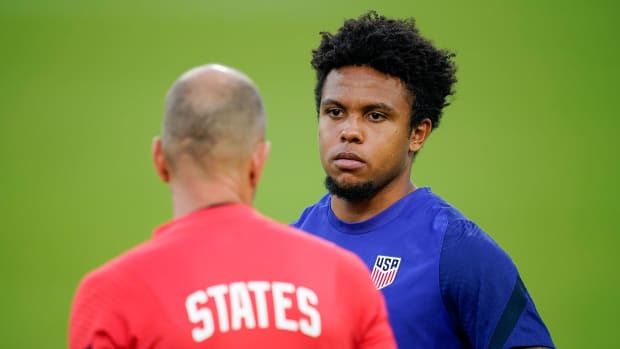
Andrew Nelles/The Tennessean/USA TODAY Network
“It’s not an ideal situation, because he’s such an important player, important character to this team. He brings obviously what he does on the field, but even off the field how close he brings the team together,” U.S. midfielder and fellow Leadership Council member Tyler Adams said. “So it’s a little disappointing, but it was that next-man-up mentality and I think when Seba [Lletget] came in, he played a good game today. Everyone needs to be ready. But it’s obviously very disappointing.”
Pulisic said, “We try not to let that whole situation effect us too much obviously. It was just about putting that all aside and focusing on the task at hand, really. Obviously we missed him today and it was just about moving forward and trying to win games.”
Along with Reyna’s injury and McKennie’s indiscipline, the U.S. is dealing with a COVID-19 diagnosis for goalkeeper Zack Steffen, who already was slated to miss his second straight game with back spasms, and a first-half ankle sprain suffered Sunday night by defender Sergiño Dest. The travel and quick turnarounds that characterize qualifying are already taxing enough. Now the U.S. is hurting physically, and very well could be more fragile emotionally following so many setbacks. The Honduras game will be a massive test of this squad’s fortitude.
“It’s not ideal. It’s less than ideal—there’s no question about that—to have guys go down,” Berhalter said. “It hurts when you’re down like that. But we have to be resilient. We can do two things: We can feel bad for ourselves or we can continue on with a positive attitude and try to get a positive result in Honduras, which we’re going to do.”
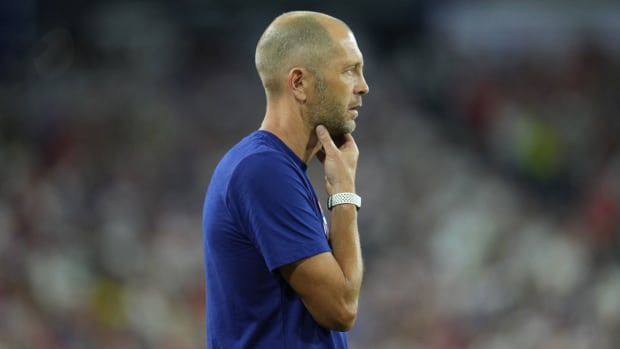
Brad Smith/ISI Photos/Getty Images
To do so, the U.S. will need more than mental gymnastics. The soccer will have to get better as well. The national team’s difficulty scoring and creating good chances from open play, which it overcame during the Gold Cup and Nations League, has been the story of both qualifiers. The field conditions and frenetic pace that bedeviled the Americans in El Salvador weren’t the issue before 43,028 fans here on the bank of the Cumberland River. Rather, it was a Canadian side that performed with impressive defensive discipline while creating problems on the counter through effervescent Bayern Munich star Alphonso Davies. Canada’s plan wasn’t a surprise. But the U.S. still couldn’t find a solution.
Despite having an enormous 72% to 28% advantage in possession, the Americans couldn’t make it count. Chances remained at a premium and after finally breaking the deadlock and their own qualifying scoreless streak with Brenden Aaronson's well-worked goal in the 55th minute, they fell victim to a Davies counter (and Cyle Larin finish) just seven minutes later. Berhalter waited until the final 10 minutes to make substantive changes, and the hosts never seemed like they were going to find the game-winning breakthrough. Canada (0-0-2) deserved its point and somehow, it feels like the U.S. has to head back to the attacking drawing board.
“We need new ideas at times,” said Pulisic, who drew several fouls but didn’t create much in the attacking third, save for one shot that hit the post. “We didn’t test them enough, whether it was not being direct enough or not, I’m not too sure. It just felt like we couldn’t break them down. Obviously, they defended well. We just need some new solutions and obviously it wasn’t good enough.”
Since obliterating tiny Martinique in the Gold Cup group stage, the U.S. has scored just five goals in six matches.
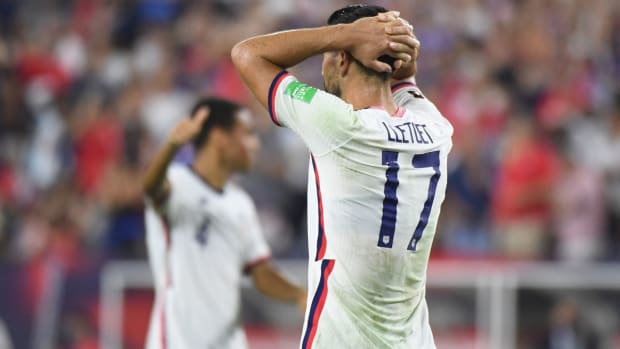
Christopher Hanewinckel/USA TODAY Sports
“We needed much faster ball movement,” Berhalter acknowledged. “We have to figure out ways to break down a compact defense, because I’m sure there’s going to be other teams that come to the United States that do the same thing.”
The message and theme coming into qualifying was that nearly three years of tactical and cultural construction, of testing and developing individual players and the chemistry among them, was leading to this—this week and these games in San Salvador, Nashville and San Pedro Sula. It was all designed to steel this young and talented side for the rigorous road to the World Cup. But the stakes and surroundings at this summer’s tournament weren’t the ideal dress rehearsal, and it’s clear after the past two matches that there are circumstances for which you can’t prepare. These games are just different, as Berhalter and his players have admitted, and the U.S. has demonstrated over the past four days that it isn’t quite ready to clear the higher hurdles. There’s another one coming Wednesday, and the runway is running out.
“We’ve got to have a long look in the mirror and really establish what our goals are here,” said Adams, who once was targeting a nine-point week. “We’re a little bit shy now of those goals that we had set. So we need to kind of recognize our thought process and figure out what’s the most important thing. So obviously three points in Honduras is what we’re looking to do, but [also] what do we need to do in the game to get the best out of the team and every single player.
"We need to challenge ourselves.”
More Soccer Coverage:
- Straus: USMNT Earns Experience and a Point in El Salvador
- Straus: Home Is Where the Heightened Expectation Is for USMNT
- Creditor: Features, Pitfalls and Favorites in Concacaf's Qualifying Octagonal
- Berhalter Laments Lack of VAR in Concacaf World Cup Qualifying
It's a bit early to panic, but a home draw vs. Canada and a lack of judgment from one of the U.S.'s leaders in the build-up to it make things more uneasy on the road to Qatar.
NASHVILLE, Tenn. — The luster and resonance of the two trophies lifted this summer is fading.
U.S. men’s national team coach Gregg Berhalter had warned that World Cup qualifying failure would erase the significance of the recent Concacaf Nations League and Gold Cup titles claimed by his young but promising team. Those were stepping stones. The World Cup is the competition of record. It’s how you’re judged and remembered.
“Winning the Nations League was nice. Winning the Gold Cup was nice,” Berhalter told his team last week before qualifying kicked off. “But this is essential. If we want to make [an] impact, guys, it’s qualifying and doing well at the World Cup.”
Qualifying hasn’t started well. Considering the circumstances, conditions and relative inexperience of Berhalter’s team, Thursday’s scoreless draw in El Salvador was understandable and acceptable. But Sunday night’s 1–1 tie against Canada at Nissan Stadium is a blow. It halts a ton of momentum, raises considerable questions about the team’s preparation and approach and puts the U.S. in an early Octagonal hole heading into Wednesday’s window-closing game in Honduras.
The U.S. (0-0-2) is now level with Honduras (0-0-2) in fourth and fifth place in Concacaf’s eight-team qualifying competition, which will send the top three finishers to Qatar and the fourth to an intercontinental playoff. Home-field misfortune played a massive role in the Americans’ failure to make the 2018 World Cup. Now Berhalter and his reborn national team are starting down a frustratingly similar path, dropping two points on home soil and facing something close to a must-win situation on Wednesday in the inhospitable cauldron of San Pedro Sula.
"Of course we expect more. We want to win. We wanted to win both of the these games, absolutely. But this is the position we’re in now," said Christian Pulisic, one of the few holdovers from 2016-17.
“I remember last qualifying losing both our first two games. So yeah, this is what it is now. We have plenty of games left to play in this qualifying, It’s almost like a season. So we still have a long way to go, so our heads are going to stay up. … We have to really turn it around and we need to start winning games.”

Christopher Hanewinckel/USA TODAY Sports
It is indeed almost like a season, and the narrative is just as rich. There are so many levels to qualifying, from the stakes, increased attention and rivalries to the travel, atmosphere and uniquely competitive environment. All of that tests a team’s culture, concentration and confidence. There’s a lot to manage and master, and it demands maturity, focus and an ability to rise to the occasion again and again. Despite the individual talent, the impressive club resumes and the two titles won this summer, this U.S. team just isn’t there yet.
“It’s a good lesson when you talk about World Cup qualifying and what these games are and the level of intensity in these games,” Berhalter said following the tie. “What you need is guys that are fit, guys that are strong, guys that are in form. That’s the most important thing.
“It’s a grueling, grueling week of three games with a lot of travel. A lot of guys have come from Europe, and that’s just part of it and we’re adapting to that,” he continued. “Obviously we would’ve loved to get the win tonight. But we’ve got to move on, and for us it’s about getting 11 fit guys on the field who will want to compete and get a result in Honduras."
The Octagonal is just beginning, but finding 11 fit guys who want to compete has already become a challenge. World Cup qualifying requires good fortune, timely execution and resolute discipline. The Americans could use a bit more of each, and their struggles on each front lend a foreboding tinge to their two-point start.

Christopher Hanewinckel/USA TODAY Sports
Berhalter made six changes from the XI that started in El Salvador. The most welcome was the return of Pulisic, who missed that trip while returning to fitness following a COVID-19 diagnosis and subsequent quarantine. He took up his customary place on left wing, captained the side and lasted all 90 minutes. But Berhalter’s plans were disrupted by a hamstring strain suffered by Gio Reyna that would rule him out of action in both Nashville and Honduras and, worse, Weston McKennie’s stunning suspension for breaking an unspecified team rule.
McKennie, 23, is one of the U.S.'s most influential players, and he’s a member of the national team’s six-man Leadership Council. While Berhalter declined to offer details, McKennie wrote via Instagram, “Unfortunately I am suspended for tonight’s match due to a violation of team COVID protocols. I am sorry for my actions. I will be cheering hard for the boys tonight and hope to be back with the team soon.”
The midfielder remained at the team hotel during the match, and Berhalter said McKennie’s availability in Honduras “remains to be seen.” McKennie is a dynamic and charismatic athlete who’s become one fo the faces of the U.S. rebuild, but he’s starting to develop a checkered disciplinary record. He was suspended by his club, Juventus, in April after hosting a party in violation of team and Italian pandemic protocols. He also tested positive for the coronavirus in October 2020.

Andrew Nelles/The Tennessean/USA TODAY Network
“It’s not an ideal situation, because he’s such an important player, important character to this team. He brings obviously what he does on the field, but even off the field how close he brings the team together,” U.S. midfielder and fellow Leadership Council member Tyler Adams said. “So it’s a little disappointing, but it was that next-man-up mentality and I think when Seba [Lletget] came in, he played a good game today. Everyone needs to be ready. But it’s obviously very disappointing.”
Pulisic said, “We try not to let that whole situation effect us too much obviously. It was just about putting that all aside and focusing on the task at hand, really. Obviously we missed him today and it was just about moving forward and trying to win games.”
Along with Reyna’s injury and McKennie’s indiscipline, the U.S. is dealing with a COVID-19 diagnosis for goalkeeper Zack Steffen, who already was slated to miss his second straight game with back spasms, and a first-half ankle sprain suffered Sunday night by defender Sergiño Dest. The travel and quick turnarounds that characterize qualifying are already taxing enough. Now the U.S. is hurting physically, and very well could be more fragile emotionally following so many setbacks. The Honduras game will be a massive test of this squad’s fortitude.
“It’s not ideal. It’s less than ideal—there’s no question about that—to have guys go down,” Berhalter said. “It hurts when you’re down like that. But we have to be resilient. We can do two things: We can feel bad for ourselves or we can continue on with a positive attitude and try to get a positive result in Honduras, which we’re going to do.”

Brad Smith/ISI Photos/Getty Images
To do so, the U.S. will need more than mental gymnastics. The soccer will have to get better as well. The national team’s difficulty scoring and creating good chances from open play, which it overcame during the Gold Cup and Nations League, has been the story of both qualifiers. The field conditions and frenetic pace that bedeviled the Americans in El Salvador weren’t the issue before 43,028 fans here on the bank of the Cumberland River. Rather, it was a Canadian side that performed with impressive defensive discipline while creating problems on the counter through effervescent Bayern Munich star Alphonso Davies. Canada’s plan wasn’t a surprise. But the U.S. still couldn’t find a solution.
Despite having an enormous 72% to 28% advantage in possession, the Americans couldn’t make it count. Chances remained at a premium and after finally breaking the deadlock and their own qualifying scoreless streak with Brenden Aaronson's well-worked goal in the 55th minute, they fell victim to a Davies counter (and Cyle Larin finish) just seven minutes later. Berhalter waited until the final 10 minutes to make substantive changes, and the hosts never seemed like they were going to find the game-winning breakthrough. Canada (0-0-2) deserved its point and somehow, it feels like the U.S. has to head back to the attacking drawing board.
“We need new ideas at times,” said Pulisic, who drew several fouls but didn’t create much in the attacking third, save for one shot that hit the post. “We didn’t test them enough, whether it was not being direct enough or not, I’m not too sure. It just felt like we couldn’t break them down. Obviously, they defended well. We just need some new solutions and obviously it wasn’t good enough.”
Since obliterating tiny Martinique in the Gold Cup group stage, the U.S. has scored just five goals in six matches.

Christopher Hanewinckel/USA TODAY Sports
“We needed much faster ball movement,” Berhalter acknowledged. “We have to figure out ways to break down a compact defense, because I’m sure there’s going to be other teams that come to the United States that do the same thing.”
The message and theme coming into qualifying was that nearly three years of tactical and cultural construction, of testing and developing individual players and the chemistry among them, was leading to this—this week and these games in San Salvador, Nashville and San Pedro Sula. It was all designed to steel this young and talented side for the rigorous road to the World Cup. But the stakes and surroundings at this summer’s tournament weren’t the ideal dress rehearsal, and it’s clear after the past two matches that there are circumstances for which you can’t prepare. These games are just different, as Berhalter and his players have admitted, and the U.S. has demonstrated over the past four days that it isn’t quite ready to clear the higher hurdles. There’s another one coming Wednesday, and the runway is running out.
“We’ve got to have a long look in the mirror and really establish what our goals are here,” said Adams, who once was targeting a nine-point week. “We’re a little bit shy now of those goals that we had set. So we need to kind of recognize our thought process and figure out what’s the most important thing. So obviously three points in Honduras is what we’re looking to do, but [also] what do we need to do in the game to get the best out of the team and every single player.
"We need to challenge ourselves.”
More Soccer Coverage:


0 Comments